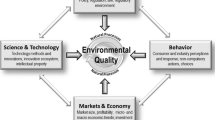Abstract
Effective integration and implementation of environmental policies is directly related to the effectiveness of environmental management. Developing more effective environmental policy and programs requires coordinating the many factors related to environmental quality. The purpose of this paper is to point out the differences in perceptions and attributes of two operating groups in society: the technologists and the ecologists. Furthermore, an attempt is made to explain the need for effective environmental management and to suggest that only when such a role is fully institutionalized will decision makers have the impetus to take both the present and the future into consideration. Only by developing an understanding of the tools used by all groups working in the environmental arena will the environmental manager be able to provide both short- and longrange perspectives. By using these perspectives, the environmental manager will be able to mold environmental factors into operational policies and objectives.
In conclusion, the systems analysis approach presented is the set of tools that can be used by the environmental manager to aid in bringing the two points of view closer together. The technologist, as well as the ecologist, will be required to work within a management system to more effectively and accurately define states of nature and assess alternatives in terms of primary, secondary, and higher-order consequences over both the short and long term.
Similar content being viewed by others
Literature cited
Baker, F., R. M. Michaels, and E. S. Preston. 1975.Public Policy Development. Wiley, New York.
Boulding, K. 1975. Truth or Power.Science, 190, 423.
Cleland, D., and W. King. 1975.Systems Analysis and Project Management (2nd ed.), McGraw-Hill, New York.
Duperrin, J. C., and M. Godet. 1975. Conjectural systems analysis problems and approach.Journal of the International Society of Technology Assessment, 1, 33–41.
House, P. W. 1973. Decision making for environmental quality. InManaging the Environment. Washington Environmental Research Center. Environmental Protection Agency, Washington, D.C.
Lindblom, C. 1973. Incrementalism and Environmentalism, InManaging the Environment. Washington Environmental Research Center, Environmental Protection Agency, Washington, D.C.
Lowrance, W. W. 1976.Of Acceptable Risk. William Kaufmann, Inc. Los Altos, California.
Odum, E. P. 1977. The emergence of ecology, a new integrative discipline.Science, 195, 1289–1293.
Rubenstein, M. F. 1975.Patterns of Problem Solving. Prentice-Hall, Englewood Cliffs, New Jersey.
Savas, E. S. 1975. New directions for urban analysis.Interfaces, 6, 1–9.
Siegel, G., and W. J. Petak. 1977. Public administration: A process of professionalization. School of Public Administration, Working Paper. University of Southern California, Los Angeles.
Author information
Authors and Affiliations
Rights and permissions
About this article
Cite this article
Petak, W.J. Environmental planning and management: The need for an integrative perspective. Environmental Management 4, 287–295 (1980). https://doi.org/10.1007/BF01869422
Issue Date:
DOI: https://doi.org/10.1007/BF01869422




